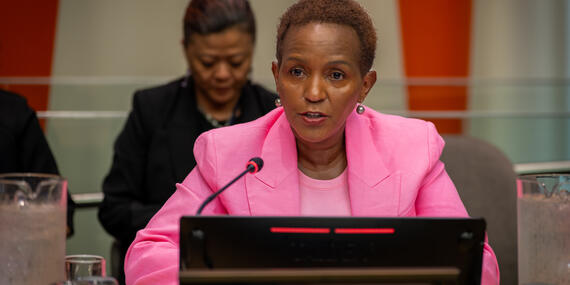Deputy relief chief calls for collaboration bound by a "shared humanity"

Closing Remarks at Economic and Social Council Humanitarian Affairs Segment by Assistant Secretary-General for Humanitarian Affairs and Deputy Emergency Relief Coordinator
As delivered
It is an honour to close the 2024 ECOSOC Humanitarian Affairs Segment.
As we have heard this week, the problems facing humanity are increasingly complex and entangled.
Not only are crises occurring in multiple global systems at the same time, but they are also taking place at a moment in human history unlike any other.
Extreme poverty in the poorest and most fragile countries continues to rise, setting back decades of progress.
The wars burning in Europe, Africa, Asia and the Middle East made last year one of the bloodiest since the end of the Cold War, with women and children suffering the worst.
Indeed, nearly one out of every five children is now either living in conflict or fleeing from it.
And these wars are breeding a culture of impunity that is fueling an increasingly widespread disregard for the rules of war.
We’re also seeing a rapid intensification of the climate and ecological crisis. Its impacts are hitting harder and faster than many predicted, inflaming the world’s existing humanitarian crises.
And just when we need it most, funding for humanitarian work is being cut.
But despite these challenges, we at the Office for the Coordination of Humanitarian Affairs and our humanitarian partners continue to do absolutely everything we can to prevent and alleviate suffering.
We’re finding ways to support long-term resilience even as we provide immediate, life-saving assistance.
And we’re doing our best to deliver fast, effective support to local organizations operating in the toughest environments.
But the pace and scale of change is rapidly outstripping our ability to respond, placing incredible strain on an overburdened system.
That’s why I have been so inspired by the discussions this week.
We have heard time and again that there are solutions to the major challenges facing today’s humanitarian system.
We have explored the transformative potential, as well as the risks, of emerging technologies like artificial intelligence.
We have revealed ways we can build on some of the most innovative responses to the hunger crisis in ways that can help end the scourge of famine once and for all.
We’ve heard from speakers from NGOs in Haiti, Nigeria, Sudan, Afghanistan, and the Democratic Republic of Congo about the urgent need for women to participate in decision-making at every single level of the humanitarian system.
We’ve also heard calls for governments to fulfil their obligations under international humanitarian law to investigate alleged war crimes and prosecute suspects.
And how, without political will, we simply will not end the abuse of laws that protect civilians from harm.
We’ve heard how impediments and the politicization of humanitarian assistance too often block the delivery of aid, and how governments must ensure that humanitarians are exempt.
Encouragingly, we’ve also heard how the humanitarian sector is getting better at confronting the climate and ecological crisis – how anticipatory approaches, early warning systems, and disaster risk reduction are strengthening resilience to increasingly frequent and devastating climate shocks.
There have also been common themes and innovative ideas that have run throughout these discussions.
- More power and finance to local responders.
- Stronger partnerships with local and national organizations.
- Really listening to those in crisis so that we can tailor our action to better meet their needs.
- Predictable funding that matches the scale of today’s crises.
- More financing for efforts to end violence against women and girls, which remains one of the most underfunded humanitarian issues in the world.
Ladies and gentlemen,
It is easy in an increasingly divided and multipolar world to focus on the differences between us, to build up walls and retreat behind narratives of “us and them”.
But we have been there before. We know the terrible costs.
Now more than ever is the time to resist this urge and instead find ways to cooperate, collaborate and compromise.
Our discussions this week have reaffirmed my belief that this is possible – that by putting humanity at the very heart of everything we do, we can put aside division and confront today’s challenges together, bound by a common understanding of our shared humanity and fired by the desire to secure the right of every person to a life of meaning, purpose and dignity, free from violence, persecution and fear.
I thank the Inter-Agency Standing Committee, Member States and all of our incredible humanitarian partners in this collective endeavour.
And I thank you, Chair, for your dedicated stewardship of this year’s Humanitarian Affairs Segment.
I also thank the OCHA team, as well as the rest of the UN, for facilitating this meeting.
I thank you.
